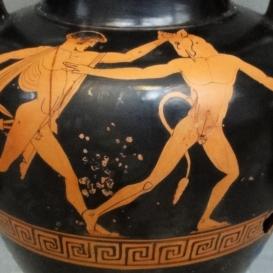Many say democracy was born in Greece, an historical land that brought culture, philosophy and the Vox Populi; the people’s voice.
Since the financial collapse of 2008 however, Greece has become increasingly associated with the fascism of the Golden Dawn party, increasingly violent protest and being ridden with the most extreme form of Austerity in the European Union.
So, how did this crisis begin for Greece? Much is owed to Political corruption and Goldman Sachs’ massaging of Greek Books to ease them into the EU, as well as German and French banks irresponsible lending. When bailouts were given to Greece, 90% went to their creditors, leaving less than 10% for the Greek government to put itself in a position even approaching comfortable. It was those banks, not the Greek people who caused the crisis (for profit) and were bailed out. The private sector was massively aided at the absolute detriment of the Greek people.
Meanwhile, a Troika (made up of the International Monetary Fund, the European Central Bank and the European Comission) demanded Austere cuts to Public Funding and the country began to fall apart. As wave after wave of austerity hit Greece Poverty Rates doubled, unemployment is at ¼ of the population, 3000 Greeks killed themselves over 4 years, prostitution increasing 1500% in 3 and 177% of the GDP is swallowed by debt. This Austerity/debt combo is killing any chance of Growth and the human cost is palpable.
Austerity has been touted as the only option, with no alternative. Syriza fought against this ideology and won on the anti-austerity ticket. Any action that disproves austerity as the only option undermines the banks enforcing it and Greece are being punished for daring to question them. Greece is performing a form of economic insurgency against the Troika’s attempts to strangle their economy. Their country is being held to ransom by the Troika, threatened with expulsion from the Euro. Yet, if that happens and Greece recovers outside the Eurozone, in a way similar to Argentina after the recession hit them hard, it would be embarrassing to the EU. Therefore, such an exit must be made as painful as possible, to make an example of the uppity Greeks.
Divide and conquer
If Greece win this battle, Spain, Ireland and Portugal could follow suit with anti-auserity movements reaching increasing numbers. So, the Troika are looking to divide and conquer the tentative coalition that is Syriza, which is appearing too easy. The Pro-Moscow element resolutely saying no to EU involvement, the centrists looking to fight austerity from within the eurozone and the social democrats wishing to do whatever deal is offered. Many within Syriza, Greece itself and the international anti-austerity movement decry the latest developments from the Troika.
Molly Scott Cato, Green MEP, calls the Eurozone “a neoliberal disciplining device”, stating that “we are all suffering attacks on our democratic and social rights because of neoliberal ideology, but Greece is the most extreme example”. Cato goes onto raise the precedent of debt forgiveness for “odious debt”, an idea SNP leader Nicola Sturgeon agrees with suggesting reforms that “boost productivity and competitiveness” rather than “what is or can be perceived as threats”.
Economic rebels
Indeed, many deride the Troika’s threats against these economic rebels, declaring the move as anti-democratic. The Greek had said yes to Austerity piled upon Austerity and seen nothing but havoc wrecked upon their homeland. Greek Prime Minister Tsripas himself referred to the Troika’s incessance as “economic asphyxia”.and the halting of the bailout as they enter a referendum a “denial of the Greeks right to reach a democratic decision”. This is of course, the central point to the current crisis, the battle between the Greeks democracy against the Troika’s hard-line neoliberal economics.
Greek energy minister Lafazanis argues that “If the Greek people say a big no, it is going to be impossible for those who wield power not to take note unless democracy no longer exists”. Juan Pablo Bohoslavsky, UN Expert on Foreign Debt and Human Rights reports that he was “disappointed that the IMF and EU have failed to reach a solution that does not require additional, retrogressive austerity measures” and wonders why “some leaders have expressed dissatisfaction with the idea of holding a referendum in Greece” as it is “in the best tradition of democratic governance”.
It would be bad for Greece, for the Troika, for the Euro (stocks have begun dropping already) and bad for democracy in Europe. Sturgeon, who also got in a Anti-austerity ticket, explains that the Troika are risking “hardening support for the outcome they say they want to avoid”, and this seems true. In London, 1000’s attended a pro-Greece Rally, in solidarity with Syriza and the Greek people, including Guardian journalist Owen Jones, Green MP Caroline Lucas and Labour forerunner Jeremy Corbyn. Only last month 250,000 people marched in London against Austerity in the UK. It is increasingly apparent that people across Europe are exercising their democratic right to say no to austerity and that there are, in fact, other options. It is the height of democracy for the people to protest against it, to vote in parties like Syriza, SNP, Podemos and for them to say no to the financial behemoths who make demands and threats like the Troika.
This is test for many elements; the EU, IMF, ECB, Syriza and the Greek People. But, most of all this a test of democracy in a neoliberal world. Many say Democracy was born in Greece. It may die there too.









